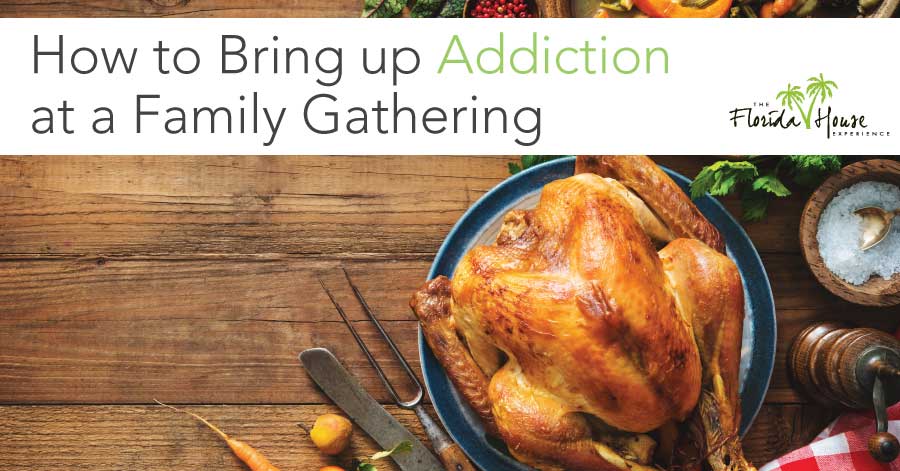
Is addiction the ‘elephant in the room’ at your family gatherings? Do you want to discuss addiction with family members at your next get-together or family party, but you’re not sure what to say?
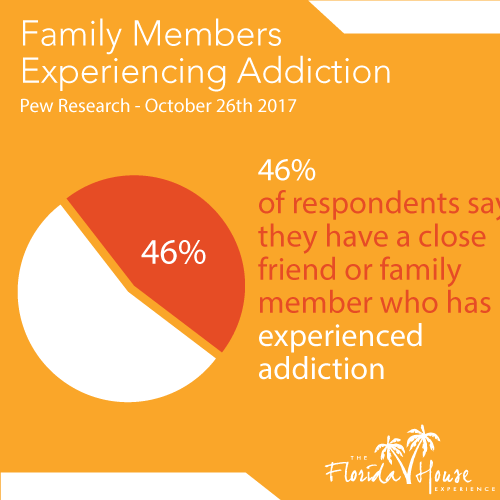
If so, you’re not alone. Millions of families across the country include one or more members who are addicted to drugs, alcohol or both, which means the questions you have are more common than you might think.
In fact, a recent study by the Pew Research Center reveals that close to half of all U.S. adults (46 percent), “have a family member or close friend who is addicted to drugs or has been in the past.”
Here at FHE Health, we know the critical role that family members and close friends can play in supporting a loved one seeking treatment for a substance abuse issue. Although there are no guarantees when it comes to recovery, a strong support system can dramatically improve the odds that an addict will complete their treatment program and stay clean.
We’re often asked how loved ones can discuss addiction at a family gathering. After all, family relationships can be tricky at the best of times, and addiction is something that can quickly shift family dynamics, cause tension, and even leave the strongest of families broken.
While no two situations are exactly alike, we can offer some advice that may help you make choices around addressing the issue of substance abuse in your family.
Talk To Other Family Members About Addiction Before A Big Event
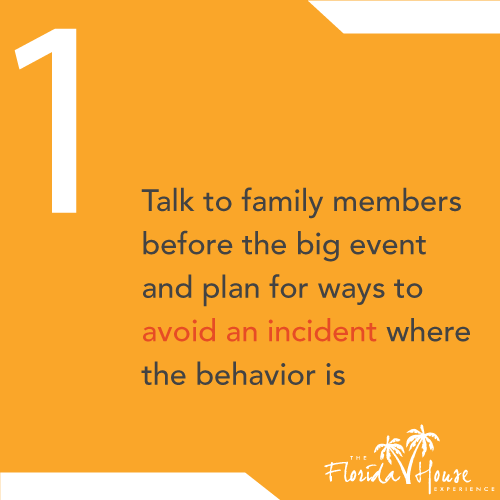 If you’re concerned about a loved one’s substance abuse, don’t wait for the next family wedding, funeral, or another big family gathering to express how you’re feeling. Speak to a trusted sibling, uncle, cousin, or close family friend ahead of time about the issue. This will help you sort out your thoughts and gain insight into how others see the situation.
If you’re concerned about a loved one’s substance abuse, don’t wait for the next family wedding, funeral, or another big family gathering to express how you’re feeling. Speak to a trusted sibling, uncle, cousin, or close family friend ahead of time about the issue. This will help you sort out your thoughts and gain insight into how others see the situation.
For example, if alcohol abuse is an issue, you may want to speak to the host about holding a ‘dry’ event where there is no alcohol present at all. If your loved one is likely to miss out on the gathering because of their substance abuse issue, make a plan ahead of time for how you’ll handle questions about where they are.
Remember, your family members may not agree with you on the issue of addiction. They may be dismissive about the amount of alcohol your aunt drinks, or the dramatic changes you’ve seen in a sibling who you think is addicted to drugs. Discussing addiction with family and close friends before your next family gathering can prevent a lot of drama and let you know who your allies really are.
Don’t Turn A Family Discussion Into A Substance-Abuse Intervention
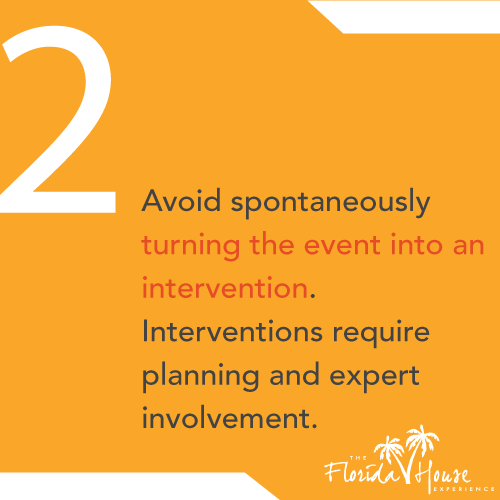 Resist the urge to turn your next family gathering into a full-blown substance abuse intervention. While television shows portray this approach as being the only way to deal with an addicted family member, the fact is that interventions should only be done under the close supervision of an experienced, licensed addictions expert.
Resist the urge to turn your next family gathering into a full-blown substance abuse intervention. While television shows portray this approach as being the only way to deal with an addicted family member, the fact is that interventions should only be done under the close supervision of an experienced, licensed addictions expert.
From the perspective of the addict, having their entire family ‘gang up’ on them at a family event may make them feel loved and supported, but it usually has the opposite effect. Cornering an addict at a family gathering can be risky – it could drive the addict away from their loved ones and do more harm than you might expect.
Remember that people who are addicted to drugs or alcohol tend to feel a lot of shame, embarrassment, and a loss of control over their substance abuse. They also often experience persistent paranoid thoughts, extreme anxiety, and other substance-induced disorders that can dramatically impact how an addict might interpret an attempt to help them.
Don’t ‘Out’ An Addict
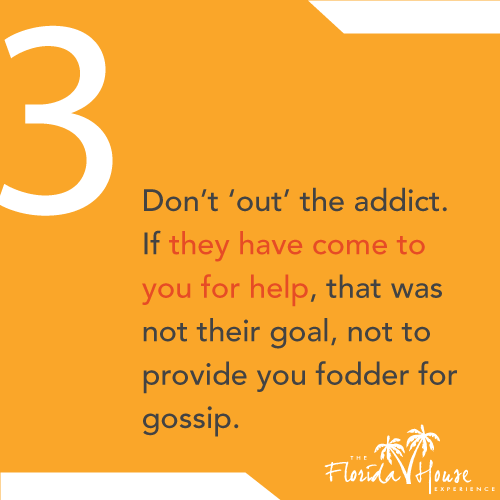 Use discretion if you decide to discuss addiction with family at a gathering. While open, honest communication is an important part of the recovery journey for both the addict and their family, there’s a big difference between being supportive and simply gossiping about a loved one who is struggling with substance abuse.
Use discretion if you decide to discuss addiction with family at a gathering. While open, honest communication is an important part of the recovery journey for both the addict and their family, there’s a big difference between being supportive and simply gossiping about a loved one who is struggling with substance abuse.
Only bring up addiction at a family gathering if your intentions are good. Do you want to talk about your family members’ addiction because you are seeking support, or do you simply want validation from your sister, uncle, or children for yourself and the hardships you’ve faced as a result of the addicts’ behaviors?
What If You’re The Addict?
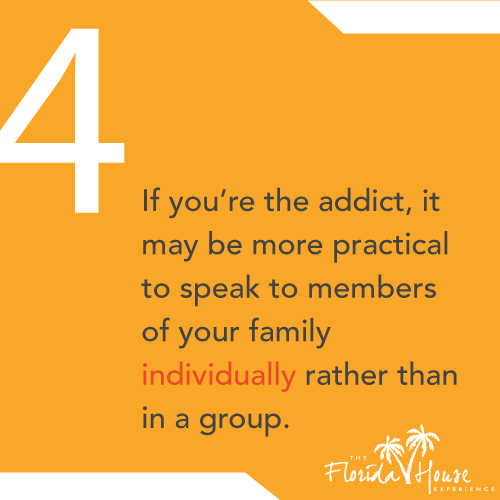 If you’re someone who struggles with substance abuse, you may need to make amends with family members as part of your recovery journey. If so, consider seeking advice from a counselor or your sponsor before bringing up your addiction at a big family event so you can plan how you’ll deal with the possible reactions from your loved ones.
If you’re someone who struggles with substance abuse, you may need to make amends with family members as part of your recovery journey. If so, consider seeking advice from a counselor or your sponsor before bringing up your addiction at a big family event so you can plan how you’ll deal with the possible reactions from your loved ones.
You may also want to share your successes with your family by celebrating your achievements at your next family gathering. Again, whether or not this is a good idea depends on your particular family dynamics, where you are at in your recovery journey, and if you are prepared to deal with a reaction that isn’t quite as positive as you had expected.
Have Questions? We’re Here For You
At the end of the day, deciding whether or not to discuss addiction at a family gathering isn’t easy. There’s a lot at stake when a family member is struggling with substance abuse – that’s why we offer a Family Program here at FHE Health where you can connect with other families, learn about addiction, and get the support you need.
Contact us at 1-866-319-3152 to speak with one of our experienced, compassionate addictions experts today.






